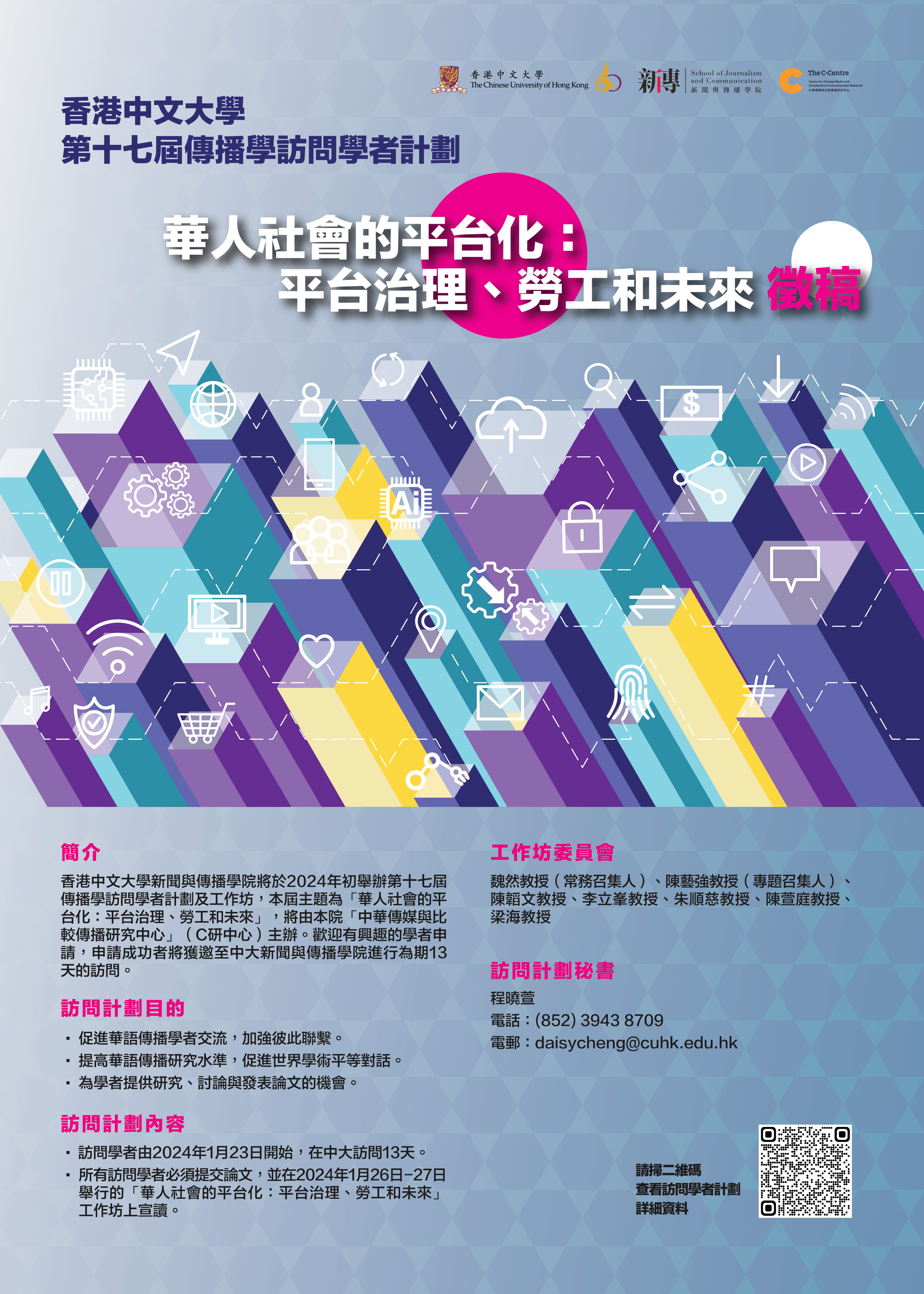The Chinese University of Hong Kong Communication Visiting Scholar Program 2024
“Platformization in Chinese Societies: Governance, Labor, and Futures” Workshop
Introduction
The School of Journalism and Communication at the Chinese University of Hong Kong has been organizing the annual Communication Visiting Scholar Program since 2008. The Program aims to promote academic exchange and links among Chinese-speaking scholars in cultural China and improve the quality of research of the Chinese research community. The Centre for Chinese Media and Comparative Communication Research (The C-Centre) of the School of Journalism and Communication will play host to this program in 2024.
Program Theme 2024
Platforms refer to an emerging type of firm which positions itself as a digital intermediary that coordinates interactions between different user groups and relies upon data extraction to gain economic and political power. Platforms have emerged as key players in reconfiguring media and cultural production, transforming the labor process, and contesting regulatory frameworks and institutions. A growing body of literature—including a special issue about the platformization of Chinese society published by the Chinese Journal of Communication (2019)—has problematized the uniformity of platformization across the globe by attending to differences in affordances, governance approaches, and political economies of platforms. Accordingly, the ways that platforms evolve, govern different user groups, shape the labor process, and challenge political governance are deeply embedded in a specific institutional context.
This workshop aims to further investigate platformization in Chinese societies and generate situated knowledge on the following three sub-themes: (1) platform governance; (2) platform labor; and (3) futures of platforms.
Sub-theme 1: Platform Governance
First, critical scholars have argued for a regional and historical approach to study platforms and platformization by exploring the state-market dynamics at different spatial levels (Zhang & Chen, 2022). This regional and historical approach helps to explore how platforms collaborate and wrestle with local and national governments as well as domestic and transnational capital. This sub-theme involves exploring questions such as: How could we historicize and regionalize platformization in Chinese societies? Indeed, Chinese platforms, such as WeChat, Douyin/TikTok, and DiDi, continue to expand their presence in oversea markets and encounter various regulatory regimes. Similarly, foreign platforms encounter similar constraints when they enter the Chinese markets. How do platforms (fail to) adapt to regulatory frameworks in different contexts? How do platforms adopt similar and different strategies to contest state governance in different political economies?
Sub-theme 2: Platform Labor
This theme examines the labor conditions and experiences of platform workers as well as the transformation of platform labor. Topics include but not limited to the impacts of platformization on work and labor; digital/data/algorithmic labor; precarity; the relationship between platforms; intermediary agencies (e.g., multichannel network companies), and workers; the impacts of emerging technology (e.g., conversational AI) on labor relations in the platform economy; labor organization and resistance; and inequalities in platform labor.
Sub-theme 3: Futures of Platforms
This theme invites scholars to envision alternatives to platform capitalism (e.g., how do the promises and challenges of platform cooperativism become intertwined with platformization in Chinese societies?) and future research directions of platform studies. Additionally, platform firms have also articulated different future-oriented visions of platformization in the past decade or so. Indeed, some platforms have already declined or disappeared, and not all envisioned futures have become realized. However, the imagined future can reveal the challenges and aspirations of the society at that time, which allows us to further historicize platform studies. Hence, we also invite scholars to consider the past, present, and future of platforms by examining the discourses about the future of platformization.
This workshop aims to generate critical insights into the historical, cultural, and regulatory trajectories underpinning platformization in Chinese societies. We welcome submissions of both empirical research and theoretical works. We are open to all methodologies. Submissions can be in Chinese or English (all presentations will be in Chinese).
Workshop Details
Date: 26 to 27 January, 2024
Venue: Room 313, Humanities Building, CUHK and ZOOM meeting room The visiting scholars will present papers on the theme of “Platformization in Chinese Societies: Governance, Labor, and Futures”.
Language of presentation and discussion: Mandarin
Workshop Participant List (in alphabetical order)
| Name | Position and Institution |
| CAO Chunxiao | Ph.D. Student, School of Journalism and Communication, Shanghai International Studies University |
| CHEN Yi-ning Katherine | Professor, College of Communication, National Chengchi University |
| CHEN Yujie Julie | Assistant Professor, Faculty of Information, University of Toronto |
| GUO Jianbin | Professor, School of Journalism and Communication, Guangzhou University |
| SUN Ping | Associate Professor, Institute of Journalism and Communication, Chinese Academy of Social Sciences |
| TA Na | Associate Professor, School of Journalism and Communication, Renmin University of China |
| WANG Hongkun | Ph.D. Candidate, School of Journalism and Communication, Tsinghua University |
| XIA Bingqing | Associate Professor, School of Communication, East China Normal University |
| XIAO Jun | Professor, School of Journalism and Communication, Wuhan University |
| XING Linzhou | Ph.D. Student, School of History and Sociology, Georgia Institute of Technology |
| XU Yan | Associate Professor, School of Journalism, Fudan University |
| ZENG Jing | Assistant Professor, Department of Media and Cultural Studies, Utrecht University |
| ZHANG Lin | Associate Professor, College of Liberal Arts, University of New Hampshire |
| ZHANG Lu | Assistant Professor, Guangming School of Journalism and Communication, China University of Political Science and Law |
| ZHOU Min | Associate Professor, School of Journalism and Communication, Shandong University |
The Annual Workshop Committee
Prof. Oliver Chan (Theme Convener)
Prof. Anthony Fung (Standing Convener)
Prof. Francis Lee (Standing Convener)
Prof. Joseph Chan
Prof. Donna Chu
Prof. Hsuan-Ting Chen
Prof. Hai Liang
Enquiry
Dr. Daisy Cheng
Phone: 3943 8709
Email: daisycheng@cuhk.edu.hk

